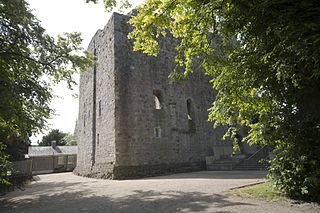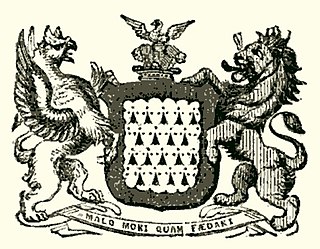Alexander Plunket was an Irish statesman and judge of the fifteenth century.

Rowland FitzEustace, 1st Baron Portlester was an Irish peer, statesman and judge. He was one of the dominant political figures in late fifteenth-century Ireland, rivalled in influence probably only by his son-in-law Garret FitzGerald, the "Great" Earl of Kildare.
Sir Gerald Aylmer was an Irish judge in the time of Henry VIII, who played a key part in enforcing the Dissolution of the Monasteries. His numerous descendants included the Barons Aylmer.

Thomas FitzJohn FitzGerald, 7th Earl of Kildare, was an Irish peer and statesman of the fifteenth century who held the office of Lord Chancellor of Ireland.

John Barnewall, 3rd Baron Trimleston, was an Irish nobleman, judge and politician. He was the eldest son of Christopher Barnewall, 2nd Baron Trimlestown and his wife Elizabeth Plunket, daughter of Sir Thomas Fitz-Christopher Plunket of Rathmore, Lord Chief Justice of the King's Bench in Ireland and his second wife Marian Cruise. He succeeded his father as 3rd Baron about 1513. His father, like most of the Anglo-Irish aristocracy, had supported the claim of the pretender Lambert Simnel to the English throne in 1487. After the failure of Simnel's rebellion, he received a royal pardon.
Sir Bartholomew Dillon was a leading Irish judge of the sixteenth century who held the offices of Chief Baron of the Irish Exchequer and Lord Justice of Ireland.
Sir Thomas Luttrell was a wealthy Anglo-Irish landowner of the sixteenth-century Irish Pale. He was also a distinguished lawyer and judge who held the offices of King's Serjeant, Solicitor General for Ireland and Chief Justice of the Irish Common Pleas.
Sir Thomas Cusack (also spelt Cusacke or Cusake) (1490–1571) was an Anglo-Irish judge and statesman of the sixteenth century, who held the offices of Master of the Rolls in Ireland, Lord Chancellor of Ireland, and Chancellor of the Exchequer of Ireland, and sat in the Irish House of Commons. He was one of the most trusted and dependable Crown servants of his time, although he led a somewhat turbulent private life.
Nicholas Nugent was an Anglo-Irish judge, who was hanged for treason by the government that appointed him. He had, before his downfall, enjoyed a highly successful career, holding office as Solicitor General for Ireland, Baron of the Irish Court of Exchequer, and Chief Justice of the Irish Common Pleas, but he was ruined by the rebellion of his nephew William Nugent, which he was accused of supporting.
James Bathe (c.1500–1570) was an Irish judge of the Tudor era, who was notable for serving as Chief Baron of the Irish Exchequer for thirty years under four successive monarchs. He was the grandfather of the 1st Earl of Roscommon, and of the noted musicologist William Bathe.
Patrick Bermingham (c.1460–1532) was an Irish judge and statesman of the Tudor period who held the offices of Lord Chief Justice of Ireland and Chancellor of the Exchequer of Ireland. He was a firm supporter of English rule in Ireland and enjoyed the confidence of Henry VIII, who regarded him as a mainstay of the Irish administration.
Luke (Lucas) Netterville was a sixteenth-century Irish judge. He was father of the statesman Richard Netterville and grandfather of the 1st Viscount Netterville.
Sir John Plunket was an Irish politician and judge of the Tudor era who held the office of Lord Chief Justice of Ireland. He was also a member of the Privy Council of Ireland and was regarded by three successive English monarchs as a valued servant of the Crown. He was noted for his integrity, but was criticised for remaining in office when old age and illness had made him clearly unfit for his duties. He was also notable as the fifth of the six husbands of Jenet Sarsfield.
Sir Simon Fitz-Richard was an Irish landowner, barrister and judge. He became Chief Justice of the Irish Common Pleas, and fought a long and successful campaign against the efforts of his enemies to remove him from office, despite the numerous accusations of corruption which were made against him.
Sir William Darcy (c.1460–1540) was a leading Anglo-Irish statesman of the Pale in the early sixteenth century; for many years he held the office of Vice-Treasurer of Ireland. He wrote an influential treatise, The Decay of Ireland, which led to his being called "the father of the movement for political reformation in Ireland". He was a colourful and flamboyant character, whose exceptional height gave rise to his nickname "Great Darcy".
Sir Thomas Kent was an Irish judge who held office as Chief Baron of the Irish Exchequer.
Sir Thomas Plunket (c.1440–1519) was a wealthy Irish landowner, lawyer and judge in fifteenth-century and early sixteenth-century Ireland. He held office as Chief Baron of the Irish Exchequer and Chief Justice of the Irish Common Pleas. After the change of the English royal family in 1485, his loyalty to the new Tudor dynasty was deeply suspect, and he was involved in two attempts to put a pretender on the English throne. On each occasion he was disgraced, fined and removed from office; yet he had sufficient political influence to ensure his return to favour and high office.
Thomas Cusacke, Cusack or de Cusack was an Irish barrister and judge, who held the offices of Attorney General for Ireland and Lord Chief Justice of Ireland. He should not be confused with his much younger cousin Sir Thomas Cusack, Lord Chancellor of Ireland, who was a child of about six when the elder Thomas died.
John Bathe (1536-1586) was an Irish lawyer and statesman of the sixteenth century. He held several important offices, including that of Attorney General for Ireland and Chancellor of the Exchequer of Ireland. He was a member of a prominent landowning family from County Dublin, and himself added to the family estates. His children included the Jesuit William Bathe, who was a noted musicologist.
Christopher Delahide was an Irish judge of the reign of Henry VIII, notable for his opposition to the Geraldine faction, who dominated Irish politics in his lifetime.



